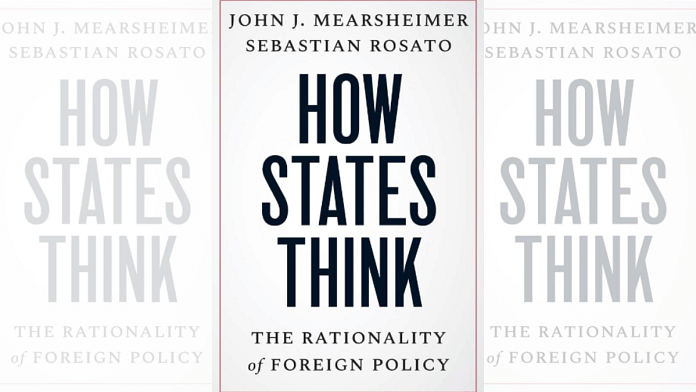Thank you dear subscribers, we are overwhelmed with your response.
Your Turn is a unique section from ThePrint featuring points of view from its subscribers. If you are a subscriber, have a point of view, please send it to us. If not, do subscribe here: https://theprint.in/subscribe/
In September 2023, the International Relations (IR) scholar, Professor John Mearsheimer (JM), published his book: How States Think (with co-author Sebastian Rosato). This article seeks to bring out some thoughts concerning the theme of the book. JM raises a crucial question: Are States fundamentally rational? It seems to be correct at the deductive level especially if a State has managed to survive. If it has not survived, it proves to be non-rational action. Still, as JM has explained in the book, it is correct at an empirical level. To understand rationality from a conceptual standpoint, JM can be credited for taking a view that social sciences have hitherto been largely based on assumption. Thus, there seems to be a good reason as to why rationality has been treated as an assumption rather than something to be problematized and explained.
If social science is about creating universal laws across space and time that cover large numbers of individual instances, one does not have the luxury of problematising rationality. It is simply assumed that rationality exists and then one focuses on understanding the products of that rationality in terms of outcomes. In fact, those outcomes then become yardsticks by which explanations in social sciences proceed. In other words, whether one problematises rationality or simply assumes it depends whether an intellectual mind is focused on universal explanation or whether it is focused on making sense of particulars. If one is focused on creating universal explanations one can get it simply by treating rationality as an assumption whose proof of existence or non-existence is determined by the aggregate outcomes and whether those aggregate outcomes essentially are consistent with our own experience. On the other hand, if one is interested in particulars with any detail of a thing/event then one does not have the luxury of simply assuming rationality. Rationality has to be problematised, one has to test for its existence and also probe its effect.
In this context, JM has argued as to why would economists, for example, derive universal laws of demand across time, space and countries. This is necessarily not the best way of examination in IR. This is especially so since IR between nation-states are premised upon transactional orientation, trust, mistrust, loyal friends, predatory friends, adversaries, enemies etc. These are heterogenous and the actions of nation-states are too differentiated. In view of this, an examination of rationality requires more sharp analysis. That’s what JM’s How States Think sets out to do. At a conceptual level, it provides succinct and pertinent analysis of the process of a State’s behaviour in the conduct of its foreign affairs. Its an innovative way of thinking as far as an instrumental rationality is concerned. There is a difference between substantive rationality and instrumental rationality. This distinction goes back to the times of Max Weber. Substantive rationality is about what is an appropriate goal that a nation-state needs to pursue in a given situation. Such a goal can be explained through a theory that describes what can be appropriately pursued in a given circumstance. Once we understand what is an appropriate goal to be pursued by a nation-state, instrumental rationality tells us that X is a better way to achieve that outcome rather than Y. It helps in making that rational distinction.
JM’s book focuses very much on the instrumentality of rationality because he presumes that substantive rationality is essentially defined by a realist theory of politics. This usually means that nation-states are primarily guided by survival in competitive world affairs. And that usually means that nation-states at the minimum have to pursue survival. Best example in today’s world is Ukraine fighting Russia’s invasion of Ukraine. So, Ukraine is not a proxy of the NATO but rather it did seek military aid and that is why the West is helping. In order to pursue survival as an appropriate goal in conflictual IR, it would be relevant to discern whether the means invoked to pursue the purported goal are appropriate for the purpose or not. In turn, that would lead to the question: how to judge the appropriateness of making such choices?
Thus, it appears, JM’s work How States Think is essentially denoting a process. As a corollary, the question of rationality in foreign policy-making assumes significance. We are still left with crucial challenge of unravelling the question as to: why nation-states behave the way they behave? It was also probed in 1968 treatise by Louis Henkin: How Nations Behave. Since the IR community engages in opinionated articles concerning issues of war and peace, it would make sense to address the proverbial thinking of the sovereign States. It may require a better and pragmatic theoretical approach to grapple with contemporary global challenges wherein 2 billion people live in conflict zones. Ideating holds a key to it.
These pieces are being published as they have been received – they have not been edited/fact-checked by ThePrint.

